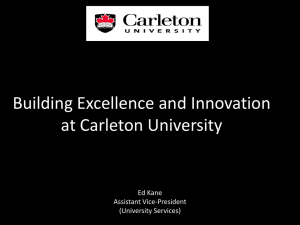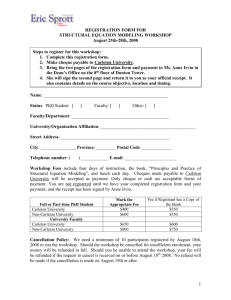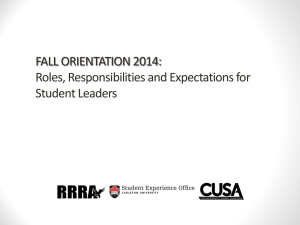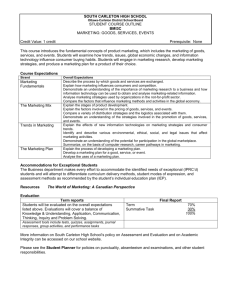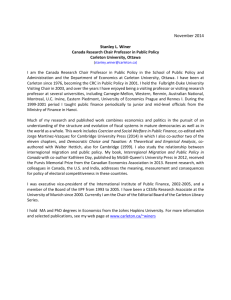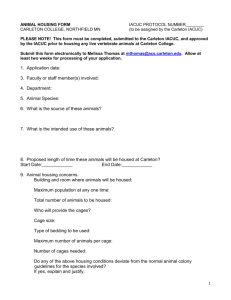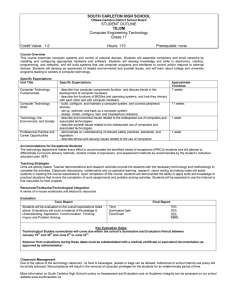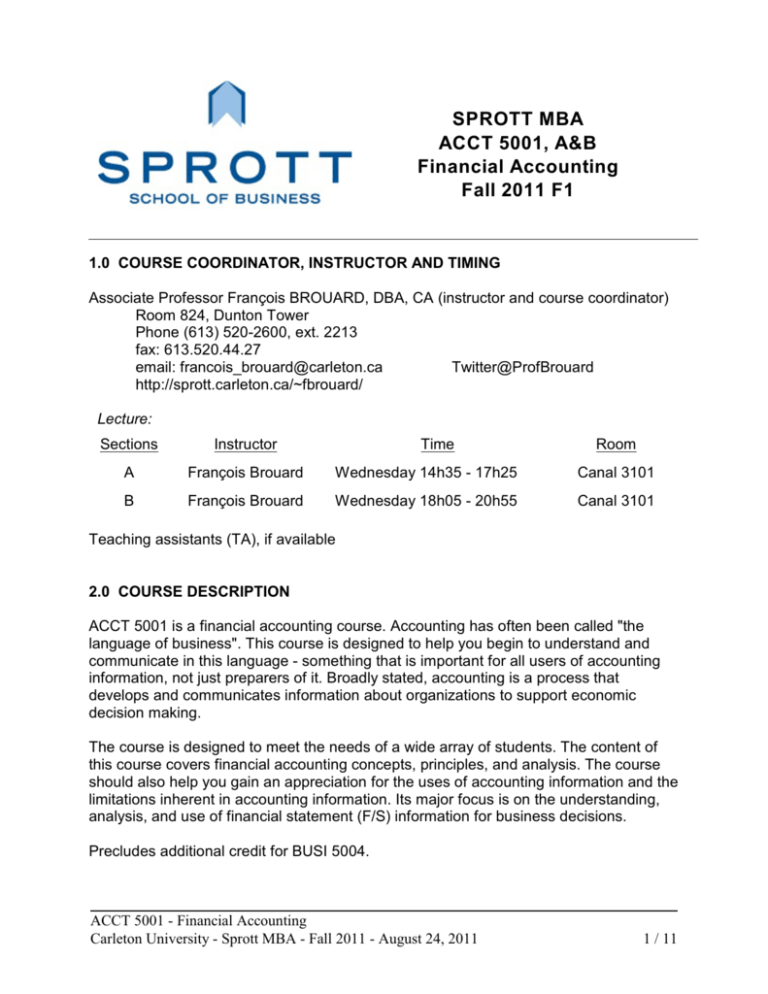
SPROTT MBA
ACCT 5001, A&B
Financial Accounting
Fall 2011 F1
1.0 COURSE COORDINATOR, INSTRUCTOR AND TIMING
Associate Professor François BROUARD, DBA, CA (instructor and course coordinator)
Room 824, Dunton Tower
Phone (613) 520-2600, ext. 2213
fax: 613.520.44.27
email: francois_brouard@carleton.ca
Twitter@ProfBrouard
http://sprott.carleton.ca/~fbrouard/
Lecture:
Sections
Instructor
Time
Room
A
François Brouard
Wednesday 14h35 - 17h25
Canal 3101
B
François Brouard
Wednesday 18h05 - 20h55
Canal 3101
Teaching assistants (TA), if available
2.0 COURSE DESCRIPTION
ACCT 5001 is a financial accounting course. Accounting has often been called "the
language of business". This course is designed to help you begin to understand and
communicate in this language - something that is important for all users of accounting
information, not just preparers of it. Broadly stated, accounting is a process that
develops and communicates information about organizations to support economic
decision making.
The course is designed to meet the needs of a wide array of students. The content of
this course covers financial accounting concepts, principles, and analysis. The course
should also help you gain an appreciation for the uses of accounting information and the
limitations inherent in accounting information. Its major focus is on the understanding,
analysis, and use of financial statement (F/S) information for business decisions.
Precludes additional credit for BUSI 5004.
ACCT 5001 - Financial Accounting
Carleton University - Sprott MBA - Fall 2011 - August 24, 2011
1 / 11
3.0 COURSE OBJECTIVES
Upon completion of this course, students will be expected to have:
(1)
a general understanding of the nature of accounting.
(2)
an understanding of the need for financial information for decisions.
(3)
an understanding of basic accounting concepts and principles.
(4)
an understanding of the preparation of financial statements.
(5)
a general knowledge of financial statement and annual report analysis.
(6)
an understanding (including the limitations) of accounting measurements and
reporting.
(7)
skills to understand and to critically analyze and interpret financial accounting
information.
4.0 METHOD OF INSTRUCTION
The format of the course consists generally of one 170-minute class meetings per week.
Due to time constraints not all chapter material will be covered in class. Students are
responsible for the entire content of each chapter of the textbook as well as all
additional topics discussed in class, except for those areas specifically excluded by the
instructor.
Class sessions entail a mixture of lecture, case study, problem analysis, and class
discussion. The content of any lecture presumes and expects you have carefully studied
the assigned reading. Lectures emphasizes major topics and readings, yet you are
responsible for all assigned materials. It requires active learning, which means that the
student must take responsibility for the learning that takes place. You must do the
problems and readings assigned and be prepared for each class. You are encouraged
to ask questions and to stimulate discussion on topics that you have difficulty
understanding.
5.0 GRADING SCHEME
Your grade for the course will depend on both individual work and group work outside of
the class, and classroom contributions, as outlined below:
Individual Class Participation
10
(see section 5.1)
Assignments
60
(see section 5.2)
*
30
(see section 5.3)
**
100
Group Project
TOTAL
ACCT 5001 - Financial Accounting
Carleton University - Sprott MBA - Fall 2011 - August 24, 2011
2 / 11
* To pass the course, students must obtain at least 50% on the group project in
addition to other requirements.
** Satisfactory In-term Performance
1) The requirement for Satisfactory In-term Performance is set at 50% of all pre-final
term work (i.e. assignments, participation marks, tests, etc.).
2) Unsatisfactory In-term Performance in this course will lead to Failure in this
course (regardless of the performance at the Final exam) FND (Failure, no
deferral) grade in this course (in case of missed Final exam)
5.1 Individual Class Participation
The intent is to have a very interactive class. Students are expected to contribute to
class discussions on a constructive and regular basis. Much of your learning will
occur during class and cases discussions. Points will be awarded for contributions to
the class. Class participation points are not awarded exclusively for "good" answers to
questions. Contributions to the class also include asking thoughtful questions, helping
to understand complicated ideas, suggesting reasonable alternatives, and being
willing to try out new ideas. Individuals may also be asked to present from time to
time as part of the individual participation component. Participation will also includes
occasional announced and unannounced quizzes.
Each student is expected to prepare cases before each class. Their working papers
will attest the attempts made by the student to learn the concepts and solve the
cases. Points will be awarded for preparation of cases. Students should bring their
working papers because the instructor could ask them to examine the work done from
time to time. A listing of cases is provided on the course web site. Self-study
problems in the textbook will provide the student with the opportunity to practice the
course material.
5.2 Assignments
The assignments include cases and problems. They should be completed
individually. The content of each assignment will be posted on the course website.
Hand-in Assignment at the beginning of each class to the instructor. If it is not
handed-in before the due date, it will be considered late and subject to a 100%
PENALTY.
NO LATE ASSIGNMENTS WILL BE ACCEPTED.
MAKE-UP ASSIGNMENTS ARE NOT PROVIDED.
Be sure to keep a copy for yourself of all your assignments and reports submitted.
The time limit for revision of the assignments is equal to 2 weeks after the date of
return.
ACCT 5001 - Financial Accounting
Carleton University - Sprott MBA - Fall 2011 - August 24, 2011
3 / 11
The suggested solutions will be made available so that students can check their own
solutions and thereby determine their understanding of the material. The instructor or
teaching assistants should be consulted if the student has difficulty in understanding
the suggested solution.
Graded assignments involve both technical aspects and judgment aspects.
Consequently, the grading of these cases and problems has both objective and
subjective components. The course instructor is committed to providing you with
adequate feedback on subjective components of your grades. Additional feedback
from your instructor is always available through consultations during scheduled office
hours or by arrangement.
5.3 Group Project
The detailed content of the Group Project will be posted on the course website. The
project will allow an integration of the financial accounting concepts.
NO LATE PROJECT WILL BE ACCEPTED.
MAKE-UP PROJECT IS NOT PROVIDED.
6.0 DROP COURSE POLICY
Students can drop a course up until the END of the second week of classes. Students
that drop a class in the third week will receive a WDN but will automatically have the
grade changed to ABS. A grade of ABS is considered a failing grade. A required course
will have to be taken again. Students with medical reasons and supporting
documentation may petition the School to have the ABS grade changed back to WDN.
7.0 OFFICE HOURS
Instructors office hours (without and with appointment) will be announced in class and
posted on the course website. A note will also be posted beside Instructor office door.
Teaching assistants may be available for consultation depending on budget allocation.
Days, times and location will be announced in class by the instructor and posted to the
course website, if any.
ACCT 5001 - Financial Accounting
Carleton University - Sprott MBA - Fall 2011 - August 24, 2011
4 / 11
8.0 COURSE MATERIALS
8.1 Required Texts
No specific textbook required.
(Even if it is not required, students without prior accounting knowledge may wish
to read chapters in a textbook to supplement courses notes.)
8.2 Web page
The instructor will make extensive use of the Internet to post course materials
(notes, cases) and other announcements. A WebCT page is used for
announcements and posting of course materials. You could find the course
WebCT page: http://webct6.carleton.ca
See also
http://sprott.carleton.ca/~fbrouard/links.html
http://sprott.carleton.ca/~fbrouard/linksaccounting.html
8.3 Supplemental References
-
-
ANTHONY, R.N., BREITNER, L.K. Essentials of Accounting, 8th edition, Upper Saddle
River, Prentice-Hall, 2003, 216p.
ANTHONY, R.N., HAWKINS, D.F., MERCHANT, K.A. Accounting: Text and Cases, 12th
Edition, Boston, McGraw-Hill Irwin, 2007, 933p.
BERGERON, P.G. Finance for non-financial managers, 5th Edition, London, Nelson,
2008, 561p.
FRASER, L.M., ORMISTON, A. Understanding Financial Statements, 9th Edition, Upper
Saddle River, Pearson Prentice-Hall, 2009, 269p.
FRASER, L.M., ORMISTON, A. Understanding the Corporate Annual Report: Nuts, Bolts
and a Few Loose Screws, Upper Saddle River, Prentice-Hall, 2003, 133p.
LERNER, J.J., CASHIN, J.A. Principles of Accounting I, 5th edition, New York, Schaum’s
Outline Series, McGraw-Hill, 1999, 388p.
LERNER, J.J., CASHIN, J.A. Principles of Accounting, New York, Schaum’s Easy
Outlines, McGraw-Hill, 2001, 153p.
ORDRE DES COMPTABLES AGRÉÉS DU QUÉBEC. Understanding Financial
Statements, n.d., 12p.
PARKINSON, J., DRAIMIN, C. Accounting for Non-Financial Managers, revised 2nd
edition, Concord, Captus Press, 2007, 470p.
PRATT, J., HIRST, D.E. Financial Reporting for Managers - A Value-Creation
Perspective, Hoboken, John Wiley & Sons, 2009, 430p.
SCHILIT, H.M., PERLER, J. Financial Shenanigans - How to detect accounting gimmicks
& fraud in financial reportsI, 3rd edition, New York, McGraw-Hill, 2010, 320p.
SCHOENEBECK, K.P. Understanding and Analyzing Financial Statements A ProjectBased Approach, 4th edition, Upper Saddle River, Pearson Prentice-Hall, 2007, 136p.
STANKO, B.B., ZELLER, T.L., BATSTONE, T.E. Introduction to the Corporate Annual
Report - A Business Application, Canadian edition, Mississauga, John Wiley & Sons
Canada, 2005, 64p.
TRACY, J.A. How to Read A Financial Report: Wringing vitals signs out of the numbers,
7th edition, Hoboken, John Wiley & Sons, 2009, 201p.
ACCT 5001 - Financial Accounting
Carleton University - Sprott MBA - Fall 2011 - August 24, 2011
5 / 11
8.4 Other Carleton University resources
Carleton University websites
Carleton University
http://www.carleton.ca/
Sprott School of Business
http://www.sprott.carleton.ca/
Sprott MBA Society
http://www3.carleton.ca/clubs/m basociety/
Sprott Paper W riting Guidelines
http://www.sprott.carleton.ca/studentservices/resources/printable/docum entation_guide.pdf
9.0 CONDUCT
Professional conduct is built upon the idea of mutual respect. Such conduct entails (but
is not necessarily limited to):
- Attending the class.
Each class benefits from the attendance and participation of all students. Your
grade for participation will be affected by absences. Regular class attendance
is important and required. I expect you to attend class and contribute to a
quality discussion. Class and team discussion of the materials (e.g., readings,
assignments, and cases) are an important part of the learning process. If
circumstances prevent attendance at a class meeting, please remember that
you are responsible for all materials discussed, handouts distributed,
assignments covered, and announcements made.
- Arriving on time.
Late arrivals are disruptive to both lectures and class discussion, and show
disrespect to those who are on time.
- Minimizing disruptions.
You should not leave and re-enter the class. You should avoid engaging in
side conversations after class has begun.
- Focusing on the class.
While you may take notes on laptops, do not use laptop computers or handheld devices for other tasks while in class. Activities such as net surfing, and
answering email are very impolite and disruptive both to neighbors and the
class.
- Being prepared for class.
You should be ready to discuss any assigned readings and to answer any
assigned questions for each day's class, including being ready to open a case
assigned for that day.
- Respect.
You should act respectfully toward all class participants. Class participation
grading reflects student adherence to these principles; students gain credit for
contributing valuable insights and students lose credit if they fail to adhere to
any of the above guidelines.
- Cellular phones.
The use of cellular phones IS NOT PERMITTED in this class. It is disruptive to
the instructor and class members. If you carry a phone to class, please make
sure it is turned off. If an emergency situation requires you to keep your cell
phone turned on you may wish to keep the silent mode on, please discuss this
with the instructor prior to the class starting.
ACCT 5001 - Financial Accounting
Carleton University - Sprott MBA - Fall 2011 - August 24, 2011
6 / 11
10.0 STUDENT PREPARATION
10.1 Background reading
Each course module contains readings about tax concepts and issues. The content of
any lecture presumes and expects you have carefully studied the assigned reading.
10.2 Homework cases and problems
Students learn technical accounting materials best when they have to apply them,
rather than listening to lectures. So, you should expect to solve problems every week.
Some of the cases and problems are for self-study; solutions are provided. Some of
the cases and problems will be important preparation for the class discussions (which
affect your individual participation points). You can’t expect to become a professional
athlete only by watching sports on TV. It’s the same thing with accounting.
10.3 Aids to help you answer the questions raised by the cases and problems
These aids may take many forms depending on requests in WebCT discussion
forum. It could be a list of hints to help you get started or progress. Sometimes, there
will be supplemental readings. Other times, the aids will direct you to one of the
campus or local libraries to use computer data bases or other reference materials to
find the information you need to help you solve the cases or problems.
10.4 Suggested approach
You could look at your study habits with the following questions.
- Have you got an overview of the chapter before the lecture?
- Have you read the slides before the lecture?
- Have you prepared cases before the lecture?
- Have you prepared your questions before attending classes?
- Have you attended class as an active learner and participant?
- Have you prepared for class as per your instructor directives?
- Have you read the chapter?
- Have you tried to solve the recommended problems/cases?
- Have you compared your personal solutions with the solutions?
- Have you tried to understand the materials by discussing it with colleagues?
- Have you consult your instructor with your problems?
- Have you consulted TA’s with your problems?
ACCT 5001 - Financial Accounting
Carleton University - Sprott MBA - Fall 2011 - August 24, 2011
7 / 11
11.0 ACADEMIC INTEGRITY
Ethics and values are very important in accounting and the world of business, non-profit
and government organizations. We will consider ethical issues in accounting throughout
this course. Ethics and values are also important in education. Instructors will assume,
unless there is evidence to the contrary, that you are an ethical student. To help you
fulfill your ethical responsibilities as a student, the ethical standards for this course are
listed below.
11.1 Graded Group Assignments
All work is to be performed exclusively by the members of the group and all group
members must contribute their fair share to each assignment. If outside research is
performed, sources are to be cited and information discovered via outside research is
to be clearly labeled as such. If outside research is performed, the products of your
research are not to be shared with any student who is not a member of the group.
11.2 Examinations
All exams must be the exclusive work of the individual student.
11.3 Plagiarism
The University’s Senate defines plagiarism in the regulations on instructional offences
as: "to use and pass off as one's own idea or product work of another without
expressly giving credit to another."
Borrowing someone else's answers, unauthorized possession of tests or answers to
tests, or possession of material designed to help answering exam questions, are also
subject to university policy regarding instructional offences. For more information on
Carleton University’s Academic Integrity Policy, consult:
http://www.carleton.ca/studentaffairs/academic_integrity
The photocopying of substantial portions of a textbook (e.g. more than 1 chapter or
15% of the total page count) without the publisher’s permission is another misuse of
intellectual property, and is also a violation of Canadian copyright law. You may also
find useful information at: http://www.library.carleton.ca/copyright/
11.4 Penalty for academic integrity violations
University recommended sanctions for academic integrity violations will be imposed.
All academic integrity violations must be reported.
ACCT 5001 - Financial Accounting
Carleton University - Sprott MBA - Fall 2011 - August 24, 2011
8 / 11
12.0 REQUIRED CALCULATOR IN BUSI COURSE EXAMINATIONS
Starting Fall 2007, only Texas Instruments BA II Plus calculators will be permitted in all
Business course examinations. This calculator is available in the campus bookstore (1st
floor, University Centre) and at various other off-campus retail stores.
13.0 GROUP WORK
The Sprott School of Business encourages group assignments in the school for several
reasons. They provide you with opportunities to develop and enhance interpersonal,
communication, leadership, follower-ship and other group skills. Group assignments are
also good for learning integrative skills for putting together a complex task. Your
professor may assign one or more group tasks/assignments/projects in this course. If
you have a group assignment, you may find useful the resources at
http://sprott.carleton.ca/academic_programs/groupwork.html
Before embarking on a specific problem as a group, it is your responsibility to ensure
that the problem is meant to be a group assignment and not an individual one.
14.0 MEDICAL CERTIFICATE
Please note that in all occasions that call for a medical certificate you must use or furnish
the information demanded in the standard university form.
http://www.carleton.ca/registrar/forms/Med_Cert_Carleton_University.pdf
15.0 PERSONS WITH DISABILITIES
Students with disabilities requiring academic accommodations in this course are
encouraged to contact a coordinator at the Paul Menton Centre (PMC) for Students with
Disabilities to complete the necessary letters of accommodation. After registering with
the PMC, make an appointment to meet and discuss your needs with your instructor at
least two weeks prior to the first in-class test or ITV midterm exam. This is necessary in
order to ensure sufficient time to make the necessary arrangements. Please note the
deadlines for submitting completed forms to the PMC for formally scheduled final exam
accommodations: November 11, 2011 for Fall and Fall/Winter term courses, and March
7, 2012 for Winter term courses. For all PMC information, please refer to
http://www.carleton.ca/pmc/
16.0 RELIGIOUS OBSERVANCE
Students requesting academic accommodation on the basis of religious observance
should make a formal, written request to their instructors for alternate dates and/or
means of satisfying academic requirements. Such requests should be made during the
ACCT 5001 - Financial Accounting
Carleton University - Sprott MBA - Fall 2011 - August 24, 2011
9 / 11
first two weeks of class, or as soon as possible after the need for accommodation is
known to exist, but no later than two weeks before the compulsory academic event.
Accommodation is to be worked out directly and on an individual basis between the
student and the instructor(s) involved. Instructors will make accommodations in a way
that avoids academic disadvantage to the student.
Students or instructors who have questions or want to confirm accommodation eligibility
of a religious event or practice may refer to the Equity Services website for a list of holy
days and Carleton’s Academic Accommodation policies, or may contact an Equity
Services Advisor in the Equity Services Department for assistance.
17.0 PREGNANCY
Pregnant students requiring academic accommodations are encouraged to contact an
Equity Advisor in Equity Services to complete a letter of accommodation. The student
must then make an appointment to discuss her needs with the instructor at least two
weeks prior to the first academic event in which it is anticipated the accommodation will
be required.
18.0 CHANGES TO THE SYLLABUS
A syllabus is a tool to help you plan your time. Every effort is made to make the syllabus
as complete as possible, but there may be occasions when changes are required. The
instructor will announce any deviations from the syllabus in class and the change will be
posted on the course web page.
19.0 RELEVANT DATES
-
MBA Boot camp - Academic Orientation. All students
are expected to be on campus.
September 6-9, 2011
-
MBA Classes F1 begin
September 12, 2011
-
University Day at Carleton, Classes suspended
October 7, 2011
-
Statutory holiday, University closed
October 10, 2011
-
MBA Classes F1 end
October 21, 2011
-
MBA Exam week F1
October 24-28, 2011
-
MBA Classes F2 begin
October 31, 2011
-
MBA Classes F2 end
December 9, 2011
-
MBA Exam week F2
December 12-16, 2011
ACCT 5001 - Financial Accounting
Carleton University - Sprott MBA - Fall 2011 - August 24, 2011
10 / 11
ACCT 5001 - SUMMARY OF SCHEDULE - Fall 2011
Lecture
W ed.
Topic
Notes
L1
Sept. 14
Introduction to Course
Nature of Accounting
Accounting Principles and GAAP
Learning Objectives for a Fin. Acc. Course
Roadm ap to Study Financial Accounting
Note on Accounting Principles and GAAP
L2
Sept. 21
Accounting Process and Cycle
Note on the Accounting Process
L3
Sept. 28
Financial Statem ents Preparation
F/S: Balance Sheet
F/S: Incom e Statem ent
F/S: Statem ent of Retained Earnings
Sea Dog Kayak inc. F/S
Note on Bank Reconciliation
Note on Inventory
L4
Oct. 5
F/S : Statem ent of Cash Flows
Note on Cash Flow Statem ent
L5
Oct. 12
Financial Inform ation
Financial Statem ent (F/S) Analysis
Annual Report Analysis
Note
Note
Note
Note
L6
Oct. 19
Using Financial Accounting Inform ation
F/S : Notes to Financial Statem ent
Note on Notes to the F/S
Note on Accountants’ Reports
on
on
on
on
F/S Analysis
F/S Analysis Main Ratios
F/S Analysis Methodology
the Annual Report
ACCT 5001 - SUMMARY OF DUE DATE - Fall 2011
Due Date
W ednesday
W ork to do
(in addition to readings and case preparation)
L1
Sept. 14
Submission of Student Information Questionnaire
Photo of students (taken by the Professor)
L2
Sept. 21
Submission of Assignment #1
L3
Sept. 28
Submission of Assignment #2
L4
Oct. 5
Submission of Assignment #3
L5
Oct. 12
Submission of Assignment #4
L6
Oct. 19
Submission of Assignment #5
Submission of Group Project Report
Bring the Sea Dog Kayak Financial Statem ents at every class.
ACCT 5001 - Financial Accounting
Carleton University - Sprott MBA - Fall 2011 - August 24, 2011
11 / 11

